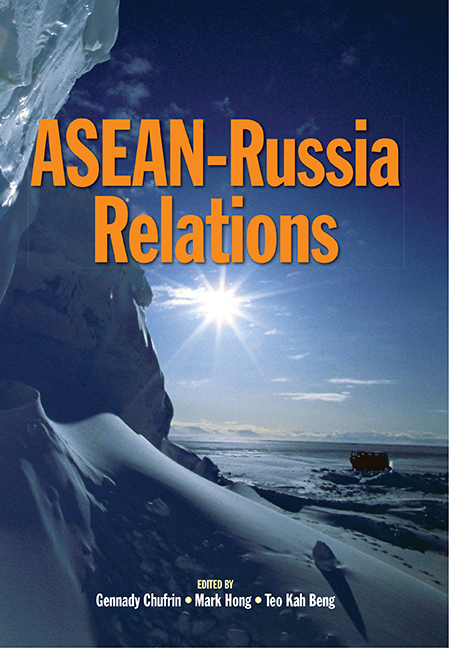Book contents
- Frontmatter
- Contents
- Foreword
- Foreword
- Opening Address
- Opening Address
- The Contributors
- Part I Overview of ASEAN-Russia Relations
- Part II Bilateral Relations
- Part III Security Issues in Southeast Asia
- 5 Terrorism in Southeast Asia
- 6 Southeast Asian Security Challenges: A View from Russia
- 7 Security Issues in Southeast Asia: Commentary
- Part IV Bilateral Economic Relations
- Index
7 - Security Issues in Southeast Asia: Commentary
from Part III - Security Issues in Southeast Asia
Published online by Cambridge University Press: 09 November 2017
- Frontmatter
- Contents
- Foreword
- Foreword
- Opening Address
- Opening Address
- The Contributors
- Part I Overview of ASEAN-Russia Relations
- Part II Bilateral Relations
- Part III Security Issues in Southeast Asia
- 5 Terrorism in Southeast Asia
- 6 Southeast Asian Security Challenges: A View from Russia
- 7 Security Issues in Southeast Asia: Commentary
- Part IV Bilateral Economic Relations
- Index
Summary
Dr. Victor Sumsky's very interesting presentation raises more questions than it answers, though mostly for good reasons. Beyond the diplomatic, multilateralist and constructivist hype, Dr. Sumsky has detected a dismal picture of emerging security threats from terrorism, piracy, transnational crime, dangerous diseases, economic shocks, the end of the developmental state model so famously pioneered in Asia, the rise of new economic and political great powers, ambivalence about the United States, enduring problems of modernization and the difficulties faced by the ASEAN states in rallying together in order to remain a regional entity and a collective player on the global arena.
Dr. Sumsky's presentation alludes to the two views on contemporary Southeast Asia that is evident in the security literature. The first is obviously the very optimistic constructivist literature that is today dominant in Southeast Asian security, that argues the case for the nascent security community that is evolving within the region. The second view is that of the late Michael Leifer's realist perception of Southeast Asia, best encapsulated in the title of Milton Osborne's book, A Region of Revolt, published in 1970. In Leifer's view, norms and multilateralism are important in constructing a better future, but in doing so one should not ignore the very existential problems within the region that continue to persist. These include internal revolts, political instability, armed separatisms and insurgencies that point to a more prescient problem of constructing the state's legitimacy, and of nation-building after decolonization.
Even today, in 2005, one could plausibly make a strong case, as Dr. Sumsky in many ways has, that Southeast Asia remains a problematic region. We see for instance, the continued salience of revolt in places such as Aceh, Malukus, Irian Jaya, Southern Thailand, among the Hmongs, the Karens in Burma, the Moros in Southern Philippines, and the Maoist communist insurgency in the Philippines. In recent days, we have also heard of the naval standoff between Indonesia and Malaysia over a disputed award of an oil concession by Malaysia along their sea border.
- Type
- Chapter
- Information
- ASEAN-Russia Relations , pp. 49 - 52Publisher: ISEAS–Yusof Ishak InstitutePrint publication year: 2006



